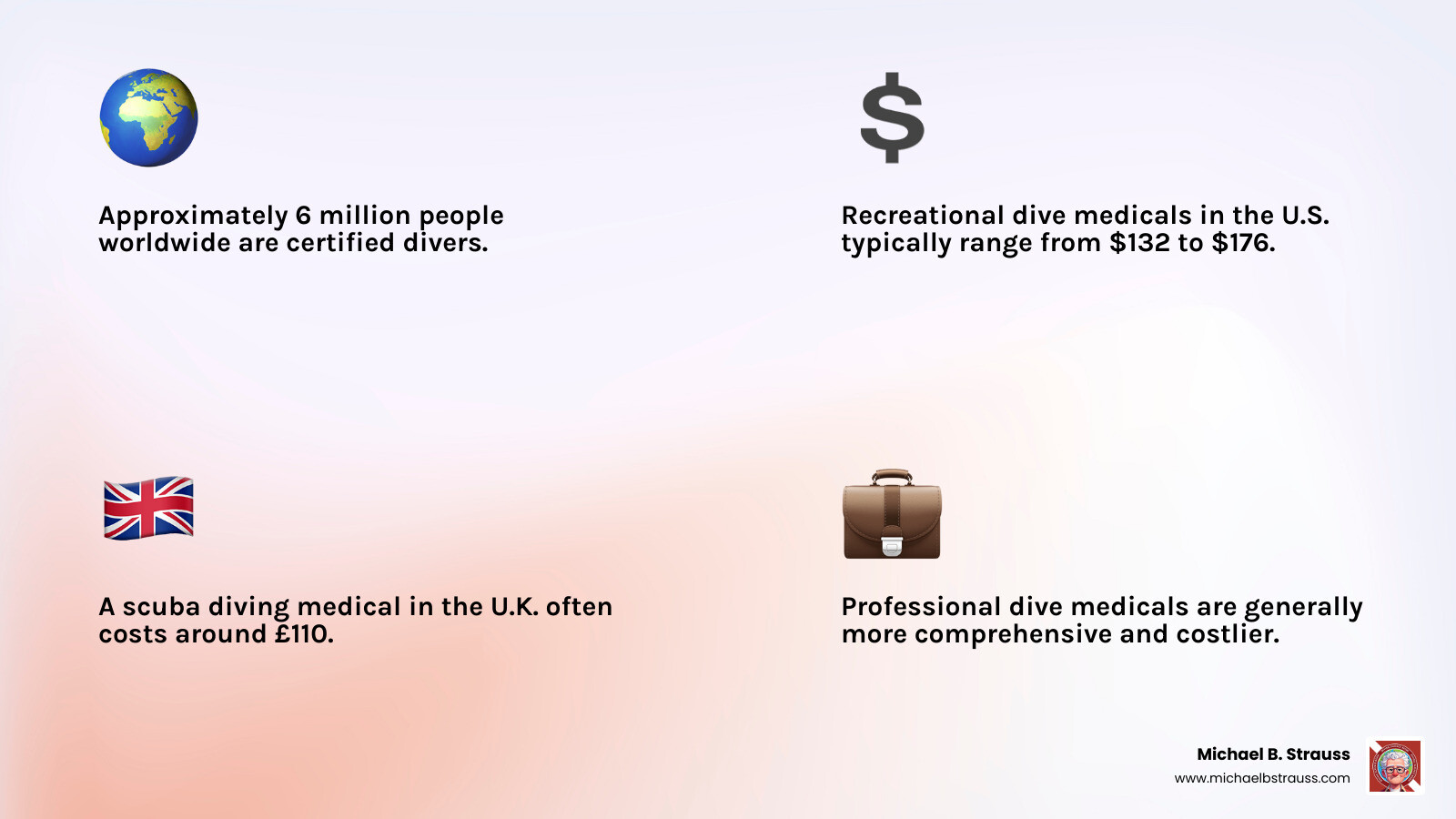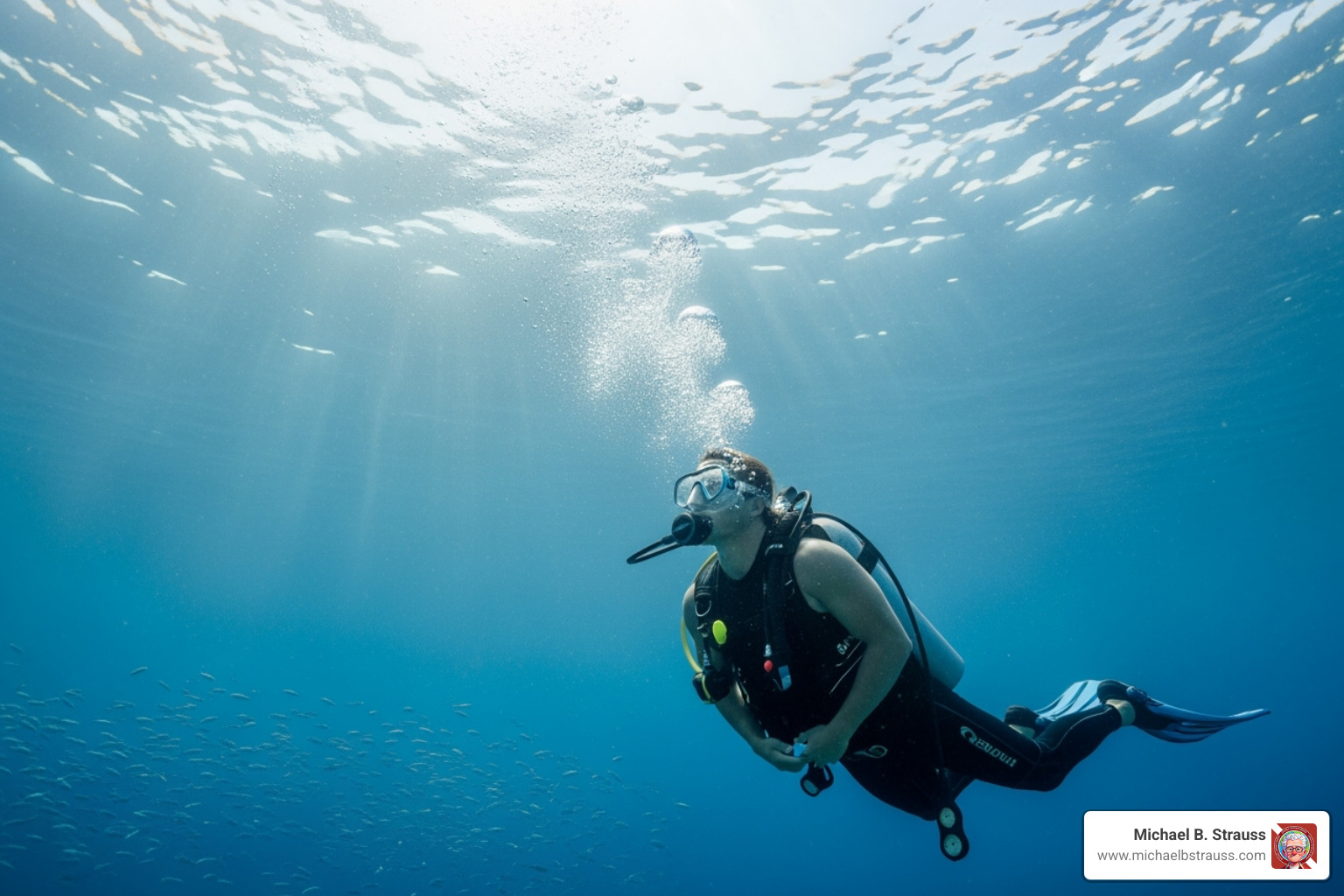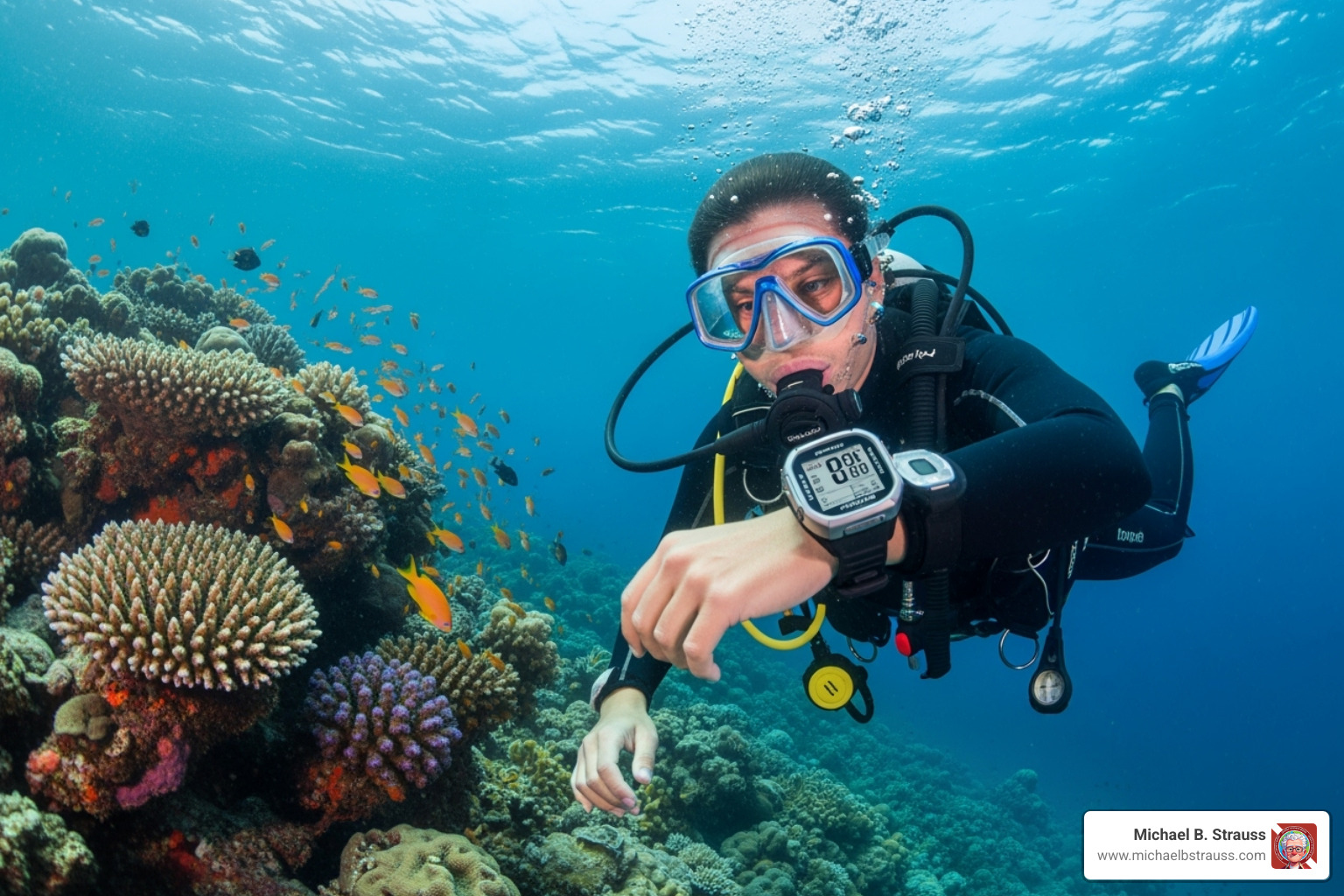Why Your Fitness to Dive Matters
The dive medical cost is an important question for anyone wanting to explore the underwater world. Understanding these costs is key, but even more vital is knowing why a dive medical is needed in the first place.
A dive medical exam makes sure you are safe and fit to dive. It checks for health conditions that could become dangerous due to the pressure changes underwater. This is why doctors look closely at your heart, lungs, and overall health.
Roughly 6 million people across the globe are certified divers. For all of them, safety comes first. A dive medical helps find possible health issues before they turn into serious problems underwater.
Here is a quick look at typical dive medical costs:
- For recreational diving in the U.S., expect to pay around $132 to $176.
- In the U.K., a scuba diving medical often costs about £110.
- Commercial or professional dive medicals are usually more detailed and can cost more.

Understanding the Dive Medical Cost and Process

Starting on a scuba diving journey, whether for recreation or as a career, begins with a crucial dive medical examination. This isn't just a formality; it's a vital safety measure. The scope and dive medical cost can vary, depending on your diving goals and local regulations, such as those in Australia or the UK.
What is a Dive Medical and Why is it Required?
A dive medical is a thorough health check-up to ensure you're physically and mentally fit for the unique pressures of the underwater environment. It's a crucial safety step to identify any underlying health issues that could become dangerous underwater. The exam typically includes a review of your medical history and a physical assessment focusing on your heart, lungs, and ears. Key tests may include spirometry for lung function, an audiometry test for hearing, and sometimes an electrocardiogram (ECG) for heart health. This comprehensive check is vital because conditions like asthma or certain heart problems can significantly increase the risk of serious incidents like decompression sickness (DCS) or arterial gas embolism (AGE). The goal is to catch potential problems on land, ensuring your safety and that of your dive buddies. To dive deeper into the fascinating science behind these evaluations and how our bodies react to the underwater world, we highly recommend exploring [More info about the science of diving](https://michaelbstrauss.com/diving-science).
Typical Recreational vs. Professional Dive Medical Cost
The dive medical cost varies based on the type of diving you do. A recreational medical is less extensive and focuses on basic fitness. In the United States, this typically costs between $132 and $176, while in the UK, it's around £110. Professional medicals for instructors or commercial divers are more comprehensive and therefore more expensive. These can range from $150 to $175 or more, often including additional tests like blood work, chest X-rays, and stress tests to meet stricter standards. The price reflects the depth of the examination required for the different levels of diving.
What Factors Influence the Price of a Dive Medical?

The dive medical cost is not a single, fixed price. It's influenced by several factors:
- Location: Costs vary significantly between countries and even between urban and rural areas.
- Type of Provider: A general practitioner (GP) may charge less than a specialist in diving or hyperbaric medicine, who can offer a more thorough evaluation.
- Required Tests: A basic exam is cheaper, but if you need additional tests like an ECG, chest X-ray, or stress test due to age, pre-existing conditions, or professional requirements, the cost will increase.
- Age and Health: Older divers or those with conditions like asthma or heart problems may require more extensive and costly examinations to ensure their safety.
Finding a qualified doctor is key. You can often locate certified physicians through diving medicine organizations such as the Undersea and Hyperbaric Medical Society (UHMS).
How Often Are Medicals Needed and What Are the Recurring Costs?
A dive medical is typically required for your first certification, but it's not a one-time event. The frequency of renewal depends on your age, health, location, and whether you're a recreational or professional diver. For example, some regions require annual medicals for all divers, while others may suggest them every few years for recreational divers under 45, and more frequently for older divers. Professional divers usually need annual check-ups. These recurring exams are an ongoing cost to factor into your diving budget. Additionally, a new medical clearance may be necessary after an illness or injury before you can safely return to the water. Maintaining your overall health is the best way to manage these long-term costs and ensure you're always fit to dive. For more insights into managing potential medical issues that can arise in diving and how they might affect your fitness, we encourage you to read [More info on managing diving medical problems](https://www.michaelbstrauss.com/post/evaluation-and-management-of-pain-related-medical-problems-of-diving).
Beyond the Exam: Insurance and Long-Term Dive Health

While getting a dive medical is a crucial first step, your financial preparedness for diving extends far beyond that initial examination. The underwater world, despite our best precautions, carries inherent risks. Understanding potential "hidden costs" and securing appropriate insurance is just as vital as your physical fitness. It's about planning for the unexpected, ensuring that a passion doesn't turn into a financial nightmare.
The Hidden Costs: Dive Accidents and Insurance
Even with careful planning, dive accidents can happen, and the costs can be staggering, far exceeding the initial dive medical cost. A serious issue like decompression sickness (DCS) can require expensive treatments that are often not covered by standard health insurance.
- Hyperbaric Chamber Treatment: A single session can be very costly, and multiple treatments are often necessary.
- Medical Evacuation: If you're in a remote location, an emergency evacuation to a medical facility can cost tens of thousands of dollars.
- Hospitalization: Associated hospital stays, specialist fees, and diagnostic tests add to the financial burden.
Many standard health insurance policies exclude "hazardous activities" like scuba diving or don't cover specialized treatments like hyperbaric oxygen therapy. This is why specialized dive accident insurance is essential. These policies are designed to cover hyperbaric treatments, medical evacuations, and other dive-related medical expenses. The annual premium is a small price to pay for peace of mind and protection against potentially devastating costs. To understand the science behind decompression and why these treatments are so vital, we encourage you to Learn about decompression science.
Investing in Your Knowledge for a Safer Dive
Beyond a medical exam and insurance, investing in your diving knowledge is crucial for safety. While it doesn't have a direct dive medical cost associated with it, it significantly reduces your risk of accidents and the associated financial burden.
Continuing education is key. Understanding diving physics, physiology, and emergency procedures helps you make safer decisions underwater. A smarter diver is a safer diver, and a safer diver is less likely to face the high costs of a dive-related injury. Knowing how pressure affects your body allows you to dive more conservatively and manage potential issues effectively.
For divers of all levels, Dr. Michael B. Strauss's comprehensive books on diving safety are an invaluable resource. They provide the scientific foundation needed to understand the risks and best practices of diving. Investing in this knowledge is an investment in your safety and long-term enjoyment of the sport.
We invite you to Explore our comprehensive resources on diving science to further improve your diving knowledge and ensure every trip is a safe one.
DISCLAIMER: Articles are for "EDUCATIONAL PURPOSES ONLY", not to be considered advice or recommendations.
To dive deeper into the science of safe diving, get your copy of "Diving Science" today: https://www.bestpub.com/view-all-products/product/diving-science-revisited/category_pathway-48.html






